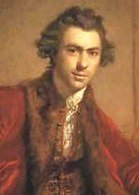... I remember especially a small g
rocery shop that had survived miraculously enough in a court off
Leadenhall Street. Banks and insurance houses towered up around, and the only other domestic link with the City's past was in the adjoining court, an ancient chop-house believed to be the last in London to give up the use of pewter plates. It seemed as unlikely there as a child's
bassinette or a collie dog. On certain days in that deep court, where the
light filters down from projection to projection, it is like the ghost of a little shop that once was there in the homely era of the City.
But it is real enough, and so is the proprietor, a sensible man with no illusions, who sells all sorts of things from pickled cucumber and tumblers for parties on Lord Mayor's Show day to smuggled cigars. Of course, the cigars came lawfully enough to him; he buys them at the sales by order of H.M. Customs of tobacco seized from the
contrabandists, but if you look into it you'll find most of his wares have a curious and interesting tag. Great bankers and walk-clerks and office-boys are among his customers, and he
must hear a good
deal about what is doing in the world of finance.
The legend on the shop reads:
'Established in 1723.'
[A friend of mine] could not discover the day and the month, so he had perforce to wait until the year had ended. Then with eagerness he repaired to the little shop, wished the
shopman good day, tried a scrubbing brush, bought a bottle of gherkins and a smuggled cigar, and discussed the price of apples. He had not been so happy since one of
Twining's shopmen told him that when he was young he was
allowed to go down below to test teas on his birthday.
James Bone, The London Perambulator (1925)


 William Hogarth, engraved ticket for Joe Miller's Benefit
William Hogarth, engraved ticket for Joe Miller's Benefit





